Since-和-for-的用法及区别
- 格式:doc
- 大小:224.50 KB
- 文档页数:8
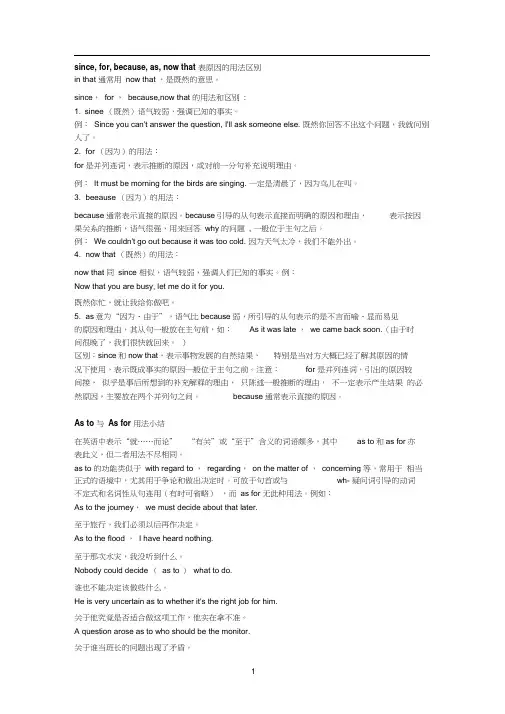
since, for, because, as, now that 表原因的用法区别in that 通常用now that ,是既然的意思。
since,for ,because,now that 的用法和区别:1. sinee (既然)语气较弱,强调已知的事实。
例:Since you can't answer the question, I'll ask someone else. 既然你回答不出这个问题,我就问别人了。
2. for (因为)的用法:for 是并列连词,表示推断的原因,或对前一分句补充说明理由。
例:It must be morning for the birds are singing. 一定是清晨了,因为鸟儿在叫。
3. beeause (因为)的用法:because通常表示直接的原因。
because引导的从句表示直接而明确的原因和理由,表示按因果关系的推断,语气很强,用来回答why 的问题, 一般位于主句之后。
例:We couldn't go out because it was too cold. 因为天气太冷,我们不能外出。
4. now that (既然)的用法:now that 同since 相似,语气较弱,强调人们已知的事实。
例:Now that you are busy, let me do it for you.既然你忙,就让我给你做吧。
5. as意为“因为、由于”,语气比because弱,所引导的从句表示的是不言而喻、显而易见的原因和理由,其从句一般放在主句前,如:As it was late ,we came back soon.(由于时间很晚了,我们很快就回来。
)区别:since和now that,表示事物发展的自然结果,特别是当对方大概已经了解其原因的情况下使用,表示既成事实的原因一般位于主句之前。
注意:for 是并列连词,引出的原因较间接,似乎是事后所想到的补充解释的理由,只陈述一般推断的理由,不一定表示产生结果的必然原因,主要放在两个并列句之间。
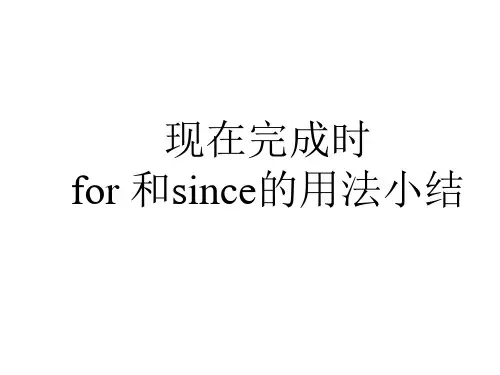

since, for, because, as, now that 表原因的用法区别in that通常用now that,是既然的意思。
since,for,because,now that的用法和区别:1.since(既然)语气较弱,强调已知的事实。
例:Since you can't answer the question, I'll ask someone else.既然你回答不出这个问题,我就问别人了。
2. for(因为)的用法:for是并列连词,表示推断的原因,或对前一分句补充说明理由。
例:It must be morning for the birds are singing.一定是清晨了,因为鸟儿在叫。
3. because (因为)的用法:because通常表示直接的原因。
because引导的从句表示直接而明确的原因和理由,表示按因果关系的推断,语气很强,用来回答why的问题, 一般位于主句之后。
例:We couldn't go out because it was too cold. 因为天气太冷,我们不能外出。
4. now that(既然)的用法:now that同since相似,语气较弱,强调人们已知的事实。
例:Now that you are busy, let me do it for you.既然你忙,就让我给你做吧。
5. as意为“因为、由于”,语气比because弱,所引导的从句表示的是不言而喻、显而易见的原因和理由,其从句一般放在主句前,如:As it was late ,we came back soon.(由于时间很晚了,我们很快就回来。
)区别:since和now that,表示事物发展的自然结果,特别是当对方大概已经了解其原因的情况下使用,表示既成事实的原因一般位于主句之前。
注意:for是并列连词,引出的原因较间接,似乎是事后所想到的补充解释的理由,只陈述一般推断的理由,不一定表示产生结果的必然原因,主要放在两个并列句之间。
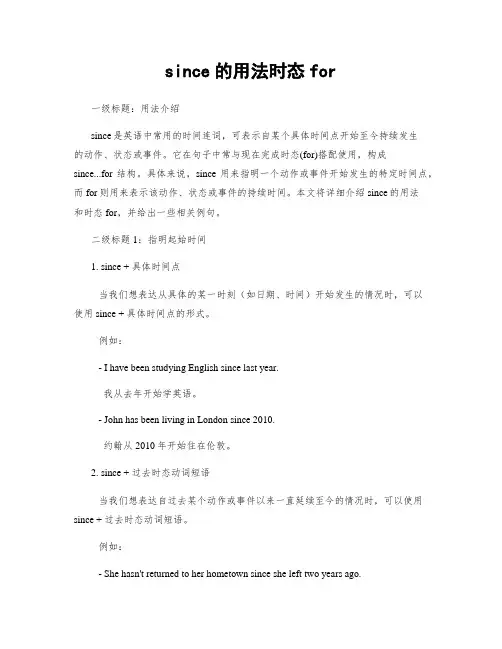
since的用法时态for一级标题:用法介绍since是英语中常用的时间连词,可表示自某个具体时间点开始至今持续发生的动作、状态或事件。
它在句子中常与现在完成时态(for)搭配使用,构成since...for结构。
具体来说,since用来指明一个动作或事件开始发生的特定时间点,而for则用来表示该动作、状态或事件的持续时间。
本文将详细介绍since的用法和时态for,并给出一些相关例句。
二级标题1:指明起始时间1. since + 具体时间点当我们想表达从具体的某一时刻(如日期、时间)开始发生的情况时,可以使用since + 具体时间点的形式。
例如:- I have been studying English since last year.我从去年开始学英语。
- John has been living in London since 2010.约翰从2010年开始住在伦敦。
2. since + 过去时态动词短语当我们想表达自过去某个动作或事件以来一直延续至今的情况时,可以使用since + 过去时态动词短语。
例如:- She hasn't returned to her hometown since she left two years ago.自两年前离开后,她就没有回过家乡。
- They have been good friends since they met in college.自从大学相识以来,他们一直是好朋友。
二级标题2:表示持续时间1. for + 时间段很多情况下我们需要表达一个动作或事件持续了多久,这时可以使用for + 时间段。
例如:- I have been working in this company for five years.我在这家公司工作已经五年了。
- We have lived in this city for a decade.我们在这个城市生活已经十年了。
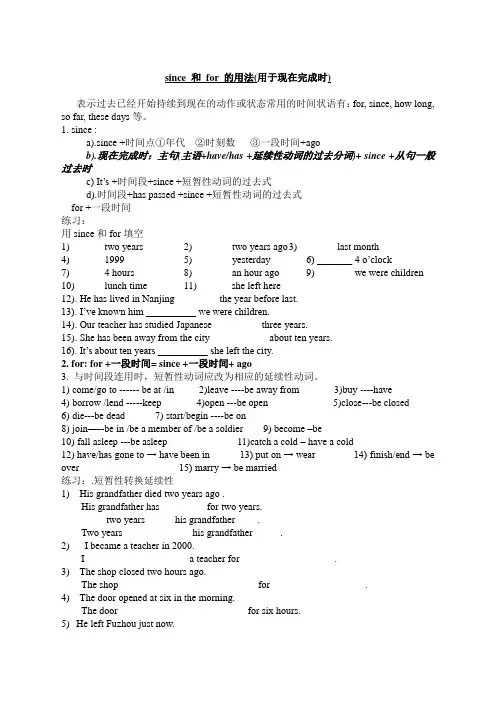
since 和for 的用法(用于现在完成时)表示过去已经开始持续到现在的动作或状态常用的时间状语有:for, since, how long, so far, these days等。
1. since :a).since +时间点①年代②时刻数③一段时间+agob).现在完成时:主句(主语+have/has +延续性动词的过去分词)+ since +从句一般过去时c) It’s +时间段+since +短暂性动词的过去式d).时间段+has passed +since +短暂性动词的过去式for +一段时间练习:用since和for填空1) ______ two years 2) _______ two years ago 3) _______ last month4) ______ 1999 5) _______ yesterday 6) _______ 4 o’clock7) ______ 4 hours 8) _______ an hour ago 9) _______ we were children 10) _____ lunch time 11) ______ she left here12). He has lived in Nanjing ________ the year before last.13). I’ve known him __________ we were children.14). Our teacher has studied Japanese _________ three years.15). She has been away from the city ___________ about ten years.16). It’s about ten years __________ she left the city.2. for: for +一段时间= since +一段时间+ ago3. 与时间段连用时,短暂性动词应改为相应的延续性动词。
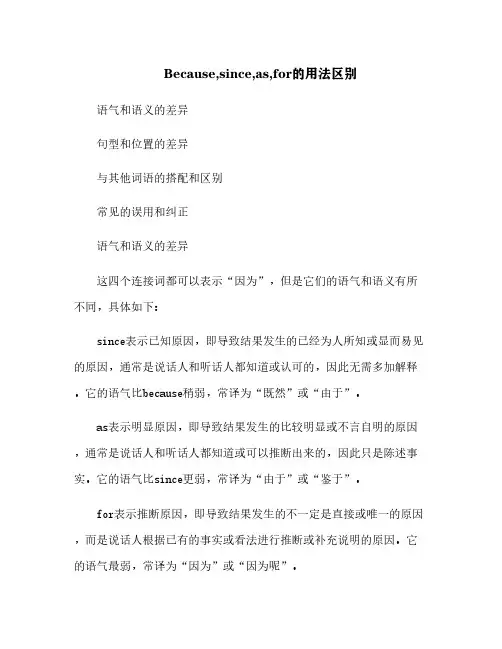
Because,since,as,for的用法区别语气和语义的差异句型和位置的差异与其他词语的搭配和区别常见的误用和纠正语气和语义的差异这四个连接词都可以表示“因为”,但是它们的语气和语义有所不同,具体如下:since表示已知原因,即导致结果发生的已经为人所知或显而易见的原因,通常是说话人和听话人都知道或认可的,因此无需多加解释。
它的语气比because稍弱,常译为“既然”或“由于”。
as表示明显原因,即导致结果发生的比较明显或不言自明的原因,通常是说话人和听话人都知道或可以推断出来的,因此只是陈述事实。
它的语气比since更弱,常译为“由于”或“鉴于”。
for表示推断原因,即导致结果发生的不一定是直接或唯一的原因,而是说话人根据已有的事实或看法进行推断或补充说明的原因。
它的语气最弱,常译为“因为”或“因为呢”。
举例说明:I stayed at home because itrned.(我呆在家里是因为下雨了。
)这里because表示下雨是我呆在家里的直接原因,可能是听话人不知道下雨了,所以需要解释。
Since you are so busy, I won't bother you anymore.(既然你这么忙,我就不再打扰你了。
)这里since表示你很忙是我不再打扰你的已知原因,可能是说话人和听话人都知道你很忙,所以无需多说。
As he is a teacher, he knows alot.(由于他是老师,他知道很多。
)这里as表示他是老师是他知道很多的明显原因,可能是说话人和听话人都认为老师知道很多,所以只是陈述事实。
He must be ill, for he lookspale.(他一定生病了,因为他看起来很苍白。
)这里for表示他看起来很苍白是他生病了的推断原因,可能是说话人根据他苍白的面色进行推测或补充说明。
句型和位置的差异这四个连接词在句型和位置上也有一些差异,具体如下:because为从属连词,引导原因状语从句,从句可以放在主句之前或之后,但如果放在主句之前,则要用逗号隔开;如果单独存在,则要用冒号引出。
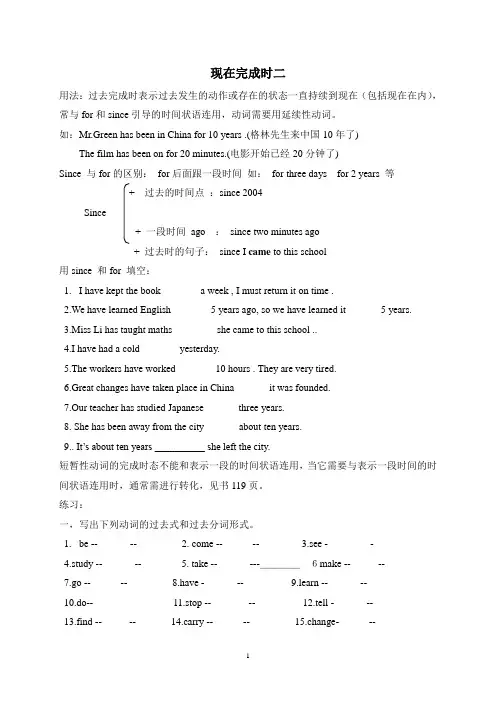
现在完成时二用法:过去完成时表示过去发生的动作或存在的状态一直持续到现在(包括现在在内),常与for和since引导的时间状语连用,动词需要用延续性动词。
如:Mr.Green has been in China for 10 years .(格林先生来中国10年了)The film has been on for 20 minutes.(电影开始已经20分钟了)Since 与for的区别:for后面跟一段时间如:for three days for 2 years 等+ 过去的时间点:since 2004Since+ 一段时间ago :since two minutes ago+ 过去时的句子:since I came to this school用since 和for 填空:1.I have kept the book _______ a week , I must return it on time .2.We have learned English _______ 5 years ago, so we have learned it ______ 5 years.3.Miss Li has taught maths ________ she came to this school ..4.I have had a cold _______ yesterday.5.The workers have worked _______ 10 hours . They are very tired.6.Great changes have taken place in China ______ it was founded.7.Our teacher has studied Japanese ______ three years.8. She has been away from the city ______ about ten years.9.. It’s about ten years __________ she left the city.短暂性动词的完成时态不能和表示一段的时间状语连用,当它需要与表示一段时间的时间状语连用时,通常需进行转化,见书119页。
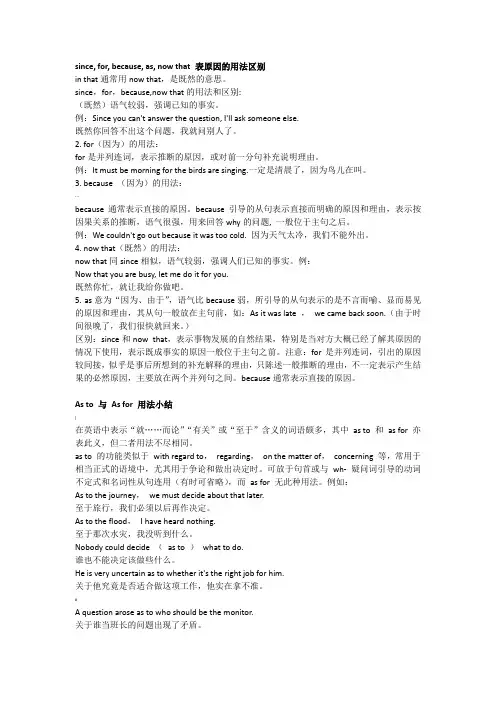
since, for, because, as, now that 表原因的用法区别in that通常用now that,是既然的意思。
since,for,because,now that的用法和区别:(既然)语气较弱,强调已知的事实。
例:Since you can't answer the question, I'll ask someone else.既然你回答不出这个问题,我就问别人了。
2. for(因为)的用法:for是并列连词,表示推断的原因,或对前一分句补充说明理由。
例:It must be morning for the birds are singing.一定是清晨了,因为鸟儿在叫。
3. because (因为)的用法:…because通常表示直接的原因。
because引导的从句表示直接而明确的原因和理由,表示按因果关系的推断,语气很强,用来回答why的问题, 一般位于主句之后。
例:We couldn't go out because it was too cold. 因为天气太冷,我们不能外出。
4. now that(既然)的用法:now that同since相似,语气较弱,强调人们已知的事实。
例:Now that you are busy, let me do it for you.既然你忙,就让我给你做吧。
5. as意为“因为、由于”,语气比because弱,所引导的从句表示的是不言而喻、显而易见的原因和理由,其从句一般放在主句前,如:As it was late ,we came back soon.(由于时间很晚了,我们很快就回来。
)区别:since和now that,表示事物发展的自然结果,特别是当对方大概已经了解其原因的情况下使用,表示既成事实的原因一般位于主句之前。
注意:for是并列连词,引出的原因较间接,似乎是事后所想到的补充解释的理由,只陈述一般推断的理由,不一定表示产生结果的必然原因,主要放在两个并列句之间。
![Because,since,as,for的用法区别[4]](https://uimg.taocdn.com/8b01010982c4bb4cf7ec4afe04a1b0717fd5b3bb.webp)
Because,since,as,for的用法区别引言语气语序语域搭配特殊用法语气表示原因或理由的连接词,从语气上由强到弱可以排列为:becau se>since>as>for。
because例如:I stayed at home because it rned. 因为下雨我呆在家里。
Lisa didn't come to school because she was ill.Lisa因病没有来上学。
It is because I have stayed here for more than 10 years that I don't want to move to other cities.是因为我们在这里已经住了10多年了,所以我不想搬到其他城市去。
(强调句型)sincesince侧重主句,从句表示显然的或已为人所知的理由,常译为“因为”、“既然”,语气比because稍弱,通常置于句首,表示一种含有勉强语气的原因。
例如:Since he is asking you, you'd better tell him why.他既然在问你,你最好告诉他为什么。
Since everyone is here, let's set out.既然大家都到齐了,我们就出发吧!asas是常用词,它表示的“原因”是双方已知的事实或显而易见的原因,或者理由不是很重要,含义与since相同,但语气更弱,没有si nce正式。
从句说明原因,主句说明结果,主从并重。
例如:We all like her as she is kind.我们都喜欢她,因为她善良。
As I had a cold, I was absent from school.因为我感冒了,所以没去上课。
forfor与because相似,但它所表示的原因往往提供上文未交待过的情况。
for不表示直接原因,表明附加或推断的理由,它所引导的分句只能放在句子后部(或单独成为一个句子),用逗号隔开,且for不可置于句首,for的这一用法常用在书面语中,较正式。
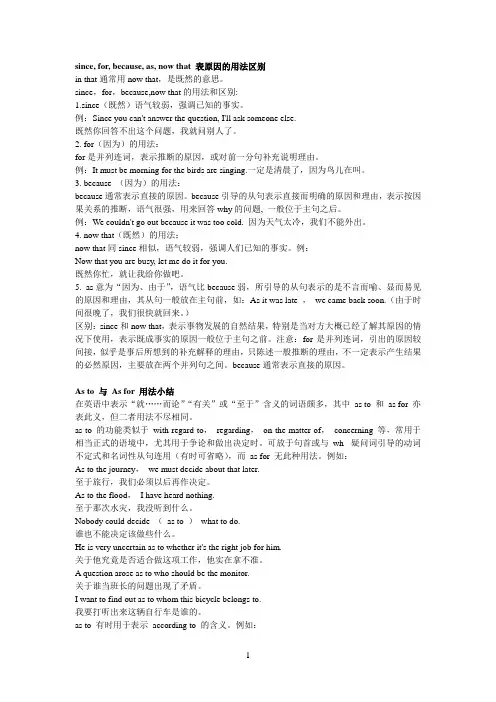
since, for, because, as, now that 表原因的用法区别in that通常用now that,是既然的意思。
since,for,because,now that的用法和区别:1.since(既然)语气较弱,强调已知的事实。
例:Since you can't answer the question, I'll ask someone else.既然你回答不出这个问题,我就问别人了。
2. for(因为)的用法:for是并列连词,表示推断的原因,或对前一分句补充说明理由。
例:It must be morning for the birds are singing.一定是清晨了,因为鸟儿在叫。
3. because (因为)的用法:because通常表示直接的原因。
because引导的从句表示直接而明确的原因和理由,表示按因果关系的推断,语气很强,用来回答why的问题, 一般位于主句之后。
例:We couldn't go out because it was too cold. 因为天气太冷,我们不能外出。
4. now that(既然)的用法:now that同since相似,语气较弱,强调人们已知的事实。
例:Now that you are busy, let me do it for you.既然你忙,就让我给你做吧。
5. as意为“因为、由于”,语气比because弱,所引导的从句表示的是不言而喻、显而易见的原因和理由,其从句一般放在主句前,如:As it was late ,we came back soon.(由于时间很晚了,我们很快就回来。
)区别:since和now that,表示事物发展的自然结果,特别是当对方大概已经了解其原因的情况下使用,表示既成事实的原因一般位于主句之前。
注意:for是并列连词,引出的原因较间接,似乎是事后所想到的补充解释的理由,只陈述一般推断的理由,不一定表示产生结果的必然原因,主要放在两个并列句之间。
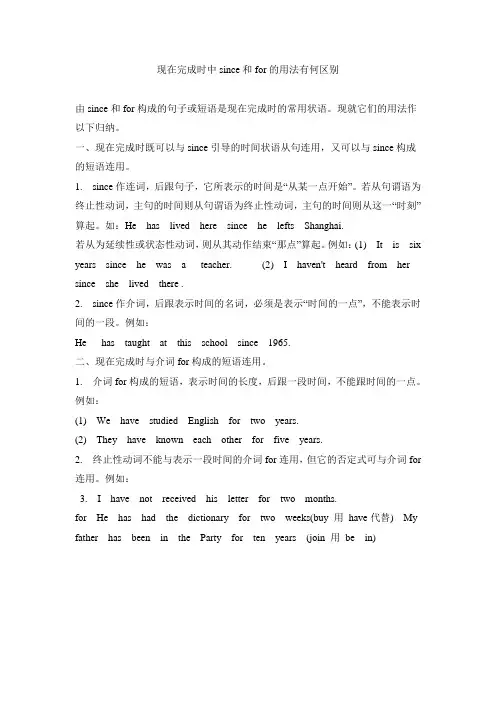
现在完成时中since和for的用法有何区别由since和for构成的句子或短语是现在完成时的常用状语。
现就它们的用法作以下归纳。
一、现在完成时既可以与since引导的时间状语从句连用,又可以与since构成的短语连用。
1. since作连词,后跟句子,它所表示的时间是“从某一点开始”。
若从句谓语为终止性动词,主句的时间则从句谓语为终止性动词,主句的时间则从这一“时刻”算起。
如:He has lived here since he lefts Shanghai.若从为延续性或状态性动词,则从其动作结束“那点”算起。
例如:(1) It is six years since he was a teacher. (2) I haven't heard from her since she lived there .2. since作介词,后跟表示时间的名词,必须是表示“时间的一点”,不能表示时间的一段。
例如:He has taught at this school since 1965.二、现在完成时与介词for构成的短语连用。
1. 介词for构成的短语,表示时间的长度,后跟一段时间,不能跟时间的一点。
例如:(1) We have studied English for two years.(2) They have known each other for five years.2. 终止性动词不能与表示一段时间的介词for连用,但它的否定式可与介词for 连用。
例如:3. I have not received his letter for two months.for He has had the dictionary for two weeks(buy 用have代替) My father has been in the Party for ten years (join 用be in)。
since, for, because, as, now that 表原因的用法区别in that通常用now that,是既然的意思。
since,for,because,now that的用法和区别:1.since〔既然〕语气较弱,强调的事实。
例:Since you can't answer the question, I'll ask someone else.既然你答复不出这个问题,我就问别人了。
2. for〔因为〕的用法:for是并列连词,表示推断的原因,或对前一分句补充说明理由。
例:It must be morning for the birds are singing.一定是清晨了,因为鸟儿在叫。
3. because 〔因为〕的用法:because通常表示直接的原因。
because引导的从句表示直接而明确的原因和理由,表示按因果关系的推断,语气很强,用来答复why的问题, 一般位于主句之后。
例:We couldn't go out because it was too cold. 因为天气太冷,我们不能外出。
4. now that〔既然〕的用法:now that同since相似,语气较弱,强调人们的事实。
例:Now that you are busy, let me do it for you.既然你忙,就让我给你做吧。
5. as意为“因为、由于〞,语气比because弱,所引导的从句表示的是不言而喻、显而易见的原因和理由,其从句一般放在主句前,如:As it was late ,we came back soon.〔由于时间很晚了,我们很快就回来。
〕区别:since和now that,表示事物开展的自然结果,特别是当对方大概已经了解其原因的情况下使用,表示既成事实的原因一般位于主句之前。
注意:for是并列连词,引出的原因较间接,似乎是事后所想到的补充解释的理由,只陈述一般推断的理由,不一定表示产生结果的必然原因,主要放在两个并列句之间。
Since-和-for-的用法及区别Since和for的用法及区别:一 ,since的四种用法1,since +过去一个时间点(如具体的年、月、日期、钟点、ago. 1990 , last month , half past sixI have been here since 1990. 1990起,我一直在这儿。
2,since+ 一段时间+agoI have been here since five months ago。
自从五个月前,我已经在这儿了。
3,since+从句GreatChanges have taken place since you left. 自从你走后,已经发生了很大的变化。
4,It is +一段时间+since从句It is two years since I became an English teacher.我成为英语老师有两年了。
2,For +时间段,用来说明动作延续时间长度,因此句中的谓语动词,也应该是延续性动词。
I have been in Beijing for one year。
We have learnt English for about three years.I have been here for 3 days.(对)I have arrived here for 3 days.(误),延续性动词和终止性动词的概念英语中,动词按其动作发生的方式、动作发生过程的长短,可分为延续性动词和终止性动词。
延续性动词表示能够延续的动作,这种动作可以延续下去或产生持久影响。
如:learn, work, stand, lie, know, walk, keep, have, wait, watch, sing, read, sleep, live, stay 等。
终止性动词也称非延续性动词、瞬间动词或短暂性动词, 表示不能延续的动作,这种动作发生后立即结束。
如open, close, finish, begin, come, go, arrive, reach, get to, leave, move, borrow,buy 等。
because、since、as、for 的用法差别because、since、as、for 这几个词都是表示“原由”的连词,语气由强至弱挨次为:because→since→as→for。
此中because、since 和as 均为附属连词,指引原因状语从句;而for 是并列连词,指引并列句。
becausebecause表示直接原由,它所指的原由往常是听话人所不知道的,其语气最强。
常用往返答why 的发问,一般放在主句以后,也能够独自存在比如:(1) I stayed at home because it rained因.为下雨,我呆在家里。
(2) Because Lingling was ill, she didn ’t com玲e玲to因sc为ho生ol病. ,没有上学。
(3) —Why is she absent? 她为何缺席?—Because she is sick. 因为她病了。
(4) 别的,在重申句型中只能用because。
比如,It was because I missed the early bus that I was late for school.我上学迟到是因为我错过了早班车。
sincesince 重视主句,从句表示明显的或已为人所知的原由,常译为“因为、既然”,语气比because稍弱,往常置于句首,表示一种含有牵强语气的原由。
比如:(1) Since he asks you, you ’ll tell him他w h既y.然问你了,那就告诉他为何吧。
(2) Since everyone is here, let 既’然s大st家a rt都. 到齐了,我们就是出发吧。
(3) Since I understood very little Japanese, I couldn ’t follow the conversation.我日语懂得不多,因此听不懂对话。
asas是常用词,它表示的“原由”是两方已知的事实或不言而喻的原由,因为原由不是很重要,含义与since同样,但语气更弱,没有since正式,常译为“因为,基于”。
as、for和since的用法区别下面是小编整理的一些关于as、for和since的用法和区别,希望对大家有帮助。
as和for都有“因为”的意思.但是as比for的语气弱.as用来表示显而易见的原因,而for却有一种解释说明的语气.例:as it is raining,we have to call of the meeting.please forgive him,for he is only 13 years old.for ,because,as,since这四个词作为连词,都有"因为"的意思,但它们在用法上有区别:because 是从属连词,接表示直接原因的从句,一般放在主句的后面,也可放在主句前面,它表示的语气最强,在回答why的问句时,必须用because.例如:The swimming pool won't be open today because they're making repairs.游泳池今天不开放,因为他们在修理.Why did you move to France?你们为什么搬到法国?Because my father found work in Paris.因为我父亲在巴黎找到了工作.注意:在英语中用了because后,不可再用so.as 是从属连词,说明一般的因果关系,语气比because弱,说明比较明显的原因,它引导的从句通常放在句首,有时也可放在句末.例如:As it is raining, you\'d better take a taxi.天下雨了,你最好乘出租车.since 意为"既然",表示对方已知的无需加以说明的原因或事实,语气比because弱,但是比as 强.例如:Since we have no money, we can't buy that vase.既然我们没钱,我们就不能买那花瓶.Since everybody is here, let's begin our party.既然大家都到了,那就开始我们的聚会吧!for 是并列连词,用来附带解释说明前一分句的原因或理由,for引导的并列句,一般放在所要说明的句子的后面.例如:I went to see him, for I had something to tell him.我去见他,因为我有事要告诉他.。
because, as, for, since 都可以表示原因,但它们的用法和区别如下:
1. **because**:这是最常用的原因连词,用于给出解释或理由。
它通常放在句子的开头,但也可以放在句中。
例如:
* I didn't go to the party because I was sick.
* I was late because the bus was late.
2. **as**:通常用于非正式的语境或对话中,并且可以放在句子的开头、中间或结尾。
例如:
* As you're not feeling well, you can stay at home.
* I'll stay at home, as the weather is bad.
3. **for**:通常用于给出理由或解释,但不如because常用。
例如:
* He was late for school, for he missed the bus.
4. **since**:通常用于表示已知的事实或前提,而不是解释或理由。
例如:
* Since you're not feeling well, you should stay at home.
总结:because 通常用于解释或理由,as 更口语化,for 较少用于给出理由,而since 更侧重于已知事实或前提。
选择哪个连词取决于语境和要表达的意思。
because, as, since, for, 的区别because的用法:通常表示直接而明确的原因和理由,语气很强,用来回答why的问题, 多放于主句之后。
例:We couldn't go out because it was too cold.因为天气太冷,我们不能外出。
as的用法:“因为、由于”,语气比because弱,表示的是不言而喻、显而易见的原因和理由,其从句一般放在主句前。
例: As it was late ,we came back soon.由于时间很晚了,我们很快就回来.As rain has fallen, the air is cooler.因为下过雨,空气比较清爽。
Since的用法:“既然”, 语气较弱,强调已知的事实,其从句一般放在主句前。
既然你回答不出这个问题,我就问别人了。
例:Since you can't answer the question, I'll ask someone else.既然他的方法不行,我们就试试你的吧.Since his method doesn't work, let's try yours.既然你对此如此有把握,他会相信你的。
Since you are so sure of it, he’ll believe you.For的用法:并列连词,表示对前一分句补充说明,放在句末。
例:It must be morning for the birds are singing.一定是清晨了,因为鸟儿在叫。
It will rain, for it’s getting dark。
要下雨了,因为天气越来越暗了。
例如:He introduced me because I was new.Since you are going, I will go, too.As it is raining, you’d better take a taxi.It must have rained last night, for the ground is wet.。
S i n c e-和-f o r-的用法及区别-CAL-FENGHAI-(2020YEAR-YICAI)_JINGBIANSince 和 for 的用法及区别:一,since 的四种用法1,since + 过去一个时间点(如具体的年、月、日期、钟点、ago. 1990 , last month , half past sixI have been here since 1990. 1990起,我一直在这儿。
2,since+ 一段时间+agoI h a v e b e e n h e r e s i n c e f i v e m o n t h s a g o。
自从五个月前,我已经在这儿了。
3,since+从句GreatChanges have taken place since you left. 自从你走后,已经发生了很大的变化。
4,It is +一段时间+since从句I t i s t w o y e a r s s i n c e I b e c a m e a n E n g l i s h t e a c h e r.我成为英语老师有两年了。
二,Since 和for区别1,Since +时间点,具体时间“自从、、、、以来,从、、、以后”用来说明动作起始时间I have been in Beijing since 2010.2,For + 时间段,用来说明动作延续时间长度,因此句中的谓语动词,也应该是延续性动词。
I have been in Beijing for one year。
We have learnt English for about three years.I have been here for 3 days. (对)I have arrived here for 3 days.(误)三,延续性动词和终止性动词的概念英语中,动词按其动作发生的方式、动作发生过程的长短,可分为延续性动词和终止性动词。
延续性动词表示能够延续的动作,这种动作可以延续下去或产生持久影响。
如:learn, work, stand, lie, know, walk, keep, have, wait, watch, sing, read, sleep,live, stay等。
终止性动词也称非延续性动词、瞬间动词或短暂性动词,表示不能延续的动作,这种动作发生后立即结束。
如open, close, finish, begin, come, go, arrive, reach, get to, leave, move, borrow,buy等。
四、延续性动词的用法特征1.延续性动词可以用于现在完成时,其完成时态可与表示"段时间"的状语连用。
表示"段时间"的短语有:for two years, during the past three years, since last year, how long 等I have learned English since I came here. 自从我来到这儿就学英语了。
2.延续性动词不能与表示短暂时间的"点时间"状语连用。
如:It raind at eight yesterday morning . (误)rain为延续性动词,而a t eight表示"点时间",前后显然矛盾。
如果用延续性动词性动词来表示一瞬间的动作,可借助come begin get等终止性动词来表示。
上句可改为:It began to rain at eight yesterday morning.(正)又如:-When did you get to know Jack-Two years ago.-Then you've known each other for more than two years.-That's right.五、终止性动词的用法特征1.终止性动词可用来表示某一动作完成,因此可用于现在完成时。
如:The train has arrived.火车到了。
Have you joined the computer group?你加入电脑小组了吗?2.终止性动词表示的动作极其短暂,不能持续。
因此,不可与表示一段时间的状语用(只限肯定式)。
如:(1)他死了三年了。
误:He has died for three years.正:He has been dead for three years.正:He died three years ago.正:It is three years since he died.正:Three years has passed since he died.(2)他来这儿五天了。
误:He has come here for five days.正:He has been here for five days.正:He came here five days ago.正:It is five days since he came here.正:Five days has passed since he came here.句中终止性动词转换为相应的延续性动词,如上面两例中的第一种正确表达方式。
下面列举几例:leave→be away, borrow→keep, buy→have, begin/start→beon, die→be dead, move to→live in, finish→be over, join→be in/be amemberof, open sth.→keep sth. open, fall ill→be ill, get up→be up, catch a cold→havea cold。
练习:用since和for填空1) ______ two years 2) _______ two years ago 3) _______ last month4) ______ 1999 5) _______ yesterday 6) _______ 4 o’clock7) ______ 4 hours 8) _______ an hour ago 9) _______ we were children 10) _____ lunch time 11) ______ she left here1. He has lived in Nanjing ________ the year before last.2. I’ve known him __________ we were children.3. Our teacher has studied Japanese _________ three years.4. She has been away from the city ___________ about ten years.5. It’s about ten years __________ she left the city.2.短暂性转换延续性①a rrive at/in sw. get to/reach sw. come/go/move to sw.→ be in sw./at school/at home/on the farm/be here/be there1) He got to Beijing five minutes ago.He ________ _________ _________ Beijing for _________ _________.2) I moved to the USA last year.I ________ ________ __________ the USA since __________ __________.3) I went home yesterday.I _______ ________ _________ home for _________ __________.4) They came here last week.They _________ _________ here since _________ __________.②come/go back, return → be back come/go out → be out1) He came out two years ago.He _________ __________ _________ for __________ __________.2) We return to Fuzhou yesterday.We ________ ________ _________ to Fuzhou since __________.③become → b e1) I became a teacher in 2000.I ________ __________ a teacher for _________ _________.2) The river became dirty last year.The river _________ _________ dirty for _________ __________.④close → be closed open → be open1) The shop closed two hours ago.The shop ________ _________ _________ for _________ _________.2) The door opened at six in the morning.The door ________ ________ ________ for six hours.⑤get up → be up die → be deadleave sw. → be away from sw.fall asleep/get tot sleep → be asleepfinish/end → be over marry → be married1) I got up two hours ago.I ________ ________ ________ since ________ ________.2) He left Fuzhou just now.He _______ ________ ________ _________ Fuzhou for five minutes.3) My grandpa died in 2002.My grandpa _______ _______ ________for _______ ________.4) The meeting finished at six.The meeting ________ ______ ______ for six hours.5) I got to sleep two hours ago.I ________ _________ _________ since _________ __________.6) They married in 1990.They ________ _________ __________since _________.⑥start/begin to do sth. → do sth. begin → be on1) I began to teach at this school in 1995.I ____ ____ at this school since ____.2) The film began two minutes ago.The film ____ ____ ____ for ____ ____.⑦borrow → keep lose → not have buy → have put on → wearcatch/get a cold → have a cold get to know → know1) They borrowed it last week.They _________ _________ it since __________ __________.2) I bought a pen two hours ago.I _________ _________ a pen for ________ __________.3) I got to know him last year.I _________ __________ him since __________ __________.4) I put on my glasses three years ago.I __________ __________ my glasses for _________ _________.⑧have/has gone to → have been in1) He has gone to Beijing.He ____ ____ _____ Beijing for two days.⑨join the league/the Party/the army→ be a league/a Party member/a soldier→ be a member of the league/the Party→ be in the league/the Party/the army1) He joined the league in 2002.He ________ _________ a _________ _________ for two years.He ________ __________ a __________ ___________ the __________ for two years.He ____________ ___________ ___________ the league for two years.2) My brother joined the army two years ago.My brother __________ __________ a ___________ for ______________________.My brother ___________ ___________ in ____________ ___________ for two years.3.汉译英1)这本字典我已买了三年了。